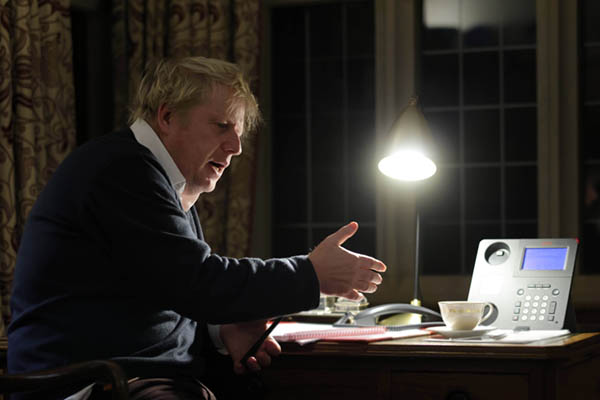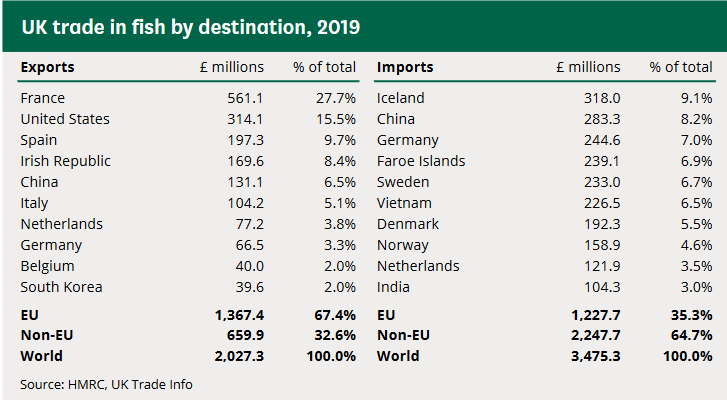Brexit Brief Newsletter
7 December 2020

Introduction
It’s the ‘final throw of the dice’ in the Brexit talks. Negotiations have resumed in Brussels, and Chancellor of the Duchy of Lancaster Michael Gove is also in the city for a meeting of the Joint Committee. We consider the controversial Internal Market Bill returning to the Commons today, and the ongoing scrutiny work by Committees on Common Frameworks and the Ireland/Northern Ireland Protocol.
It’s 50-50
Negotiations between the EU and UK broke off on Friday evening, after a week of intense talks in London, with the negotiators stating “ that the conditions for an agreement are not met, due to significant divergences on level playing field, governance, and fisheries” – the three issues which have dogged the talks for months. European Commission President Ursula von der Leyen and Prime Minister Boris Johnson then spoke on the phone and decided that talks should resume to see if the remaining issues could be resolved. They will speak again this evening (Monday) at 4pm.
 .
.
Source: Andrew Parsons / No 10 Downing Street
Some observers see this call as potentially part of “heavy choreography” towards getting a last-minute deal. Also feeding into the sequence is the return of the Internal Market Bill to the Commons, and the meeting of the Joint Committee, which has been working to resolve issues posed by the Ireland/Northern Ireland Protocol (such as defining ‘at risk’ goods, and exit summary declarations for NI-GB goods).
There were reports of a breakthrough on fishing but this was refuted by UK sources and EU Chief negotiator Michel Barnier. Previously the EU had proposed that 18% of its catch quota for UK waters could be returned to British fishermen. The issue has proven to be totemic for the UK’s vision of Brexit. However, in 2019, the sector accounted for only 0.02% of the UK’s total GVA. Fish processing accounted for 19,179 jobs in the UK in 2018.

Source: UK Parliament Research Briefings
The issue is also highly important for the EU, not least France. The EU sees access to UK waters for EU fishermen as a fair price for the UK’s preferential access to the EU single market. Fish exports to the EU were worth £1.4 billion in 2019 (67% of all UK fish exports). France’s Europe Minister Clement Beaune has warned that it “will not accept a bad deal and a bad deal in fisheries in particular.” There have been further reports over the weekend of France potentially wielding its veto if it is not satisfied with a deal.
Aside from the approximately 95% of the deal which has already been agreed, the only other area where there appears to be some consensus is the likelihood of a deal: Ireland’s Taoiseach Micheál Martin put this at 50-50 on Sunday, and senior UK Government figures agree. However, one EU aide put the chance of no deal at 99%. We hope in the next Brexit Brief we will be able provide you with more telling figures. Irish Foreign Minister Simon Coveney, who is in Brussels today, stated that Michel Barnier was “downbeat” and “cautious” in his briefing to EU Ambassadors this morning. Barnier has told members of the European Parliament that if a deal can be reached on Wednesday, it would be sent to the Parliament in time for a vote on 28 or 29 December.
Joint Committee meets in Brussels
Michael Gove also returns to Brussels today to meet Maroš Šefčovič, his co-chair of the Joint Committee. The Committee is working to resolve issues relating to the Ireland/Northern Ireland Protocol, including the definition of ‘at risk’ goods, exit summary declarations for goods moving from NI to GB, and how state aid rules applying to Northern Ireland would ‘reach back’ to the rest of the UK.

Source: Twitter @MarosSefcovic
On Friday, there was no indication that a meeting of the Joint Committee would take place this week. RTÉ reported on Sunday that the UK Government would drop the controversial clauses in the Internal Market Bill if a trade deal is reached with the EU, and if solutions are found to assuage their concerns about the working of the Protocol. The suggestion was that a meeting of the Joint Committee could quickly be called if agreement could be reached, and the UK would subsequently drop the clauses in the IMB which breach the Protocol if alternative solutions are found. The meeting and negotiations are taking place ahead of this year’s final meeting of the European Council on Thursday and Friday.
Clauses breaching the Protocol re-emerge
The Internal Market Bill returns to the House of Commons today (Monday). The Bill is intended to preserve the UK Internal Market and maintain the free flow of trade across its constituent parts. However, it has proven controversial because of its clauses on Northern Ireland which would disapply parts of the Ireland/Northern Ireland Protocol and would contravene international law. The House of Lords removed these clauses but the Government is set to reinstate them. The Commons will vote on the Bill this evening and so the parliamentary ‘ping pong’ between the Commons and Lords commences.
On Wednesday the Taxation (Post-transition Period) Bill will be voted on in the Commons in its second reading. This Bill will include similar measures relating to Northern Ireland. However, as it is a money bill, the Lords is unable to make amendments to it.
The IMB has brought distrust to the negotiations, and the European Commission launched an infringement procedure against the UK. Barnier this morning described the Bills as “a real topic of concern”. The European Parliament UK Coordination Group and the political group leaders issued a statement saying it will not ratify a trade deal if the offending clauses in the IMB still stand.
Common Frameworks
The Committee for Agriculture, Environment and Rural Affairs heard from the Department for Agriculture, Environment and Rural Affairs (DAERA) on the Common Framework for Chemicals and Pesticides. DAERA has received largely positive feedback from stakeholders on the framework, which is one of several coming to the Committee in the coming months. When the Brexit transition period ends, the UK will no longer apply European Single Market law which regulated around 160 areas of devolved competence. The Common Frameworks are a collaborative way to avoid policy divergence and enable the functioning of the UK internal market. How Common Frameworks are expected to function alongside the Internal Market Bill is not entirely clear. This is an issue the Lords Common Frameworks Scrutiny Committee has been considering, and last week it heard from Chloe Smith MP, Minister for the Constitution and Devolution. She said the Ireland/Northern Ireland Protocol and Frameworks are on two slightly different levels; one is a general point and one is specific. The Frameworks are about “collaborating to sensibly manage very specific fields of potential divergence” which is “capable of being done alongside the exigencies of the Protocol”. She told the Committee she would revert with more information on how the Frameworks coexist with the Protocol.
On Wednesday, the NI Assembly Committee for the Executive Office will meet with the Common Frameworks Scrutiny Committee. The UK Government’s latest report on Common Frameworks is due to be published this month.
Customs preparedness
The Northern Ireland Affairs Committee heard from Cabinet Office and HM Revenue and Customs officials on preparedness for the Ireland/Northern Ireland Protocol. Officials said checks will be ‘light touch’ and that it will take a ‘sympathetic’ approach but did not validate reports of a unilateral six month easing of customs. HMRC estimates that there 11 million customs declarations for GB-NI trade each year, but this figure has been disputed by some Northern Ireland business groups who say the figure is much larger. Meanwhile NI Economy Minister Diane Dodds launched a new online tool to help services exporters prepare for the end of the transition period.
Joint Ministerial Committee meets
The Joint Ministerial Committee on EU negotiations met on 3 December via video conference. First Minister Arlene Foster, deputy First Minister Michelle O’Neill and the two Junior Ministers attended from the Northern Ireland Executive. The Committee discussed arrangements for the end of the Transition Period, the implementation of the Ireland/Northern Ireland Protocol and legislation, Common Frameworks, the UK Internal Market Bill, and intergovernmental relations.
Catch up with the Committees
- Wednesday 2 December, 9.30 am - Committee for Infrastructure - Consideration of EU Exit legislation (Port Services, Railways Regulations)
- Thursday 3 December, 9.30 am - Committee for Agriculture, Environment and Rural Affairs - Common Frameworks: Animal Health and Welfare and Zootechnics; Chemicals and Pesticides (tbc) - Oral Evidence from DAERA; Written Briefings from DAERA on EU Exit legislation, and on EU Exit Preparation and Delivery
This Week at the Assembly
- Tuesday 8 December, 10.30 am – Plenary - EU Exit Statutory Rules
- Wednesday 9 December, 10 am - Committee for Economy - Update on the Shared Prosperity Fund; EU Exit Secondary Legislation
- Wednesday 9 December, 2 pm - Committee for the Executive Office - Meeting with the House of Lords Common Frameworks Scrutiny Committee; EU funding /participation in EU programmes in the future - Oral evidence from Departmental Officials
- Thursday 10 December, 10 am - Committee for Agriculture, Environment and Rural Affairs - Written Briefings from DAERA on Common Frameworks on (i) Animal Health and Welfare and (ii) Zootechnical Breeding: Provisional Approval and Engagement; EU Exit Legislation; UK Framework Outline Agreement for Radioactive Substances; EU Exit Preparation and Delivery - Oral Evidence from DAERA
- Thursday 10 December, 2 pm - Justice Committee - SR: The Carriage of Explosives (Amendment) (EU Exit) Regulations (Northern Ireland) 2020



